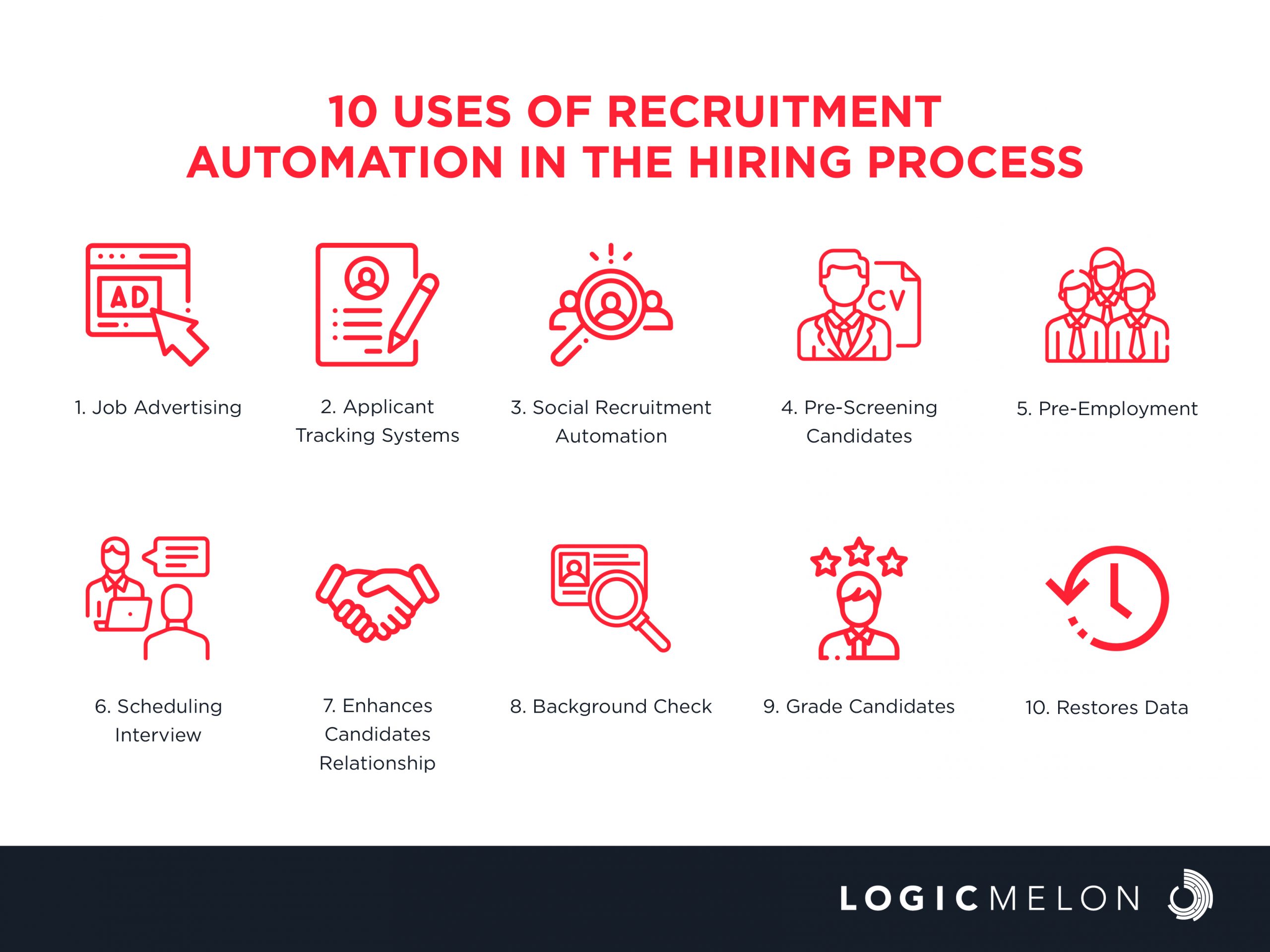10 Uses of Recruitment Automation in the Hiring Processes
Recruitment automation empowers recruiting teams to automate the time-consuming, everyday recruiting routines. This improves the overall efficiency, productivity, and overall way that candidates are hired.
Recruitment automation technology is a solution that uses artificial intelligence and machine learning to streamline talent acquisition efforts. Talent acquisition teams use this automation software to find the top talent in the market who is suitable for their organisation.
Benefits of Recruitment Automation
1. Increased Productivity
Recruiting automation increases recruiter productivity with AI-powered technology, which selects suitable candidates from the applications received. Recruitment Automation is not necessary to replace recruiters but to empower them to work more efficiently, and make better decisions at a faster pace, as well as to increase recruiter productivity.
2. Quality of Hire
The quality of hire is important for any organisation to strive towards its objectives by sourcing candidates that fit into the company culture. Automation tools lead the way for recruiters to hire candidates based on characteristics that are necessary for the job, in this way, the hiring process is more consistent for selecting candidates.
3. Improved the Candidate’s Experience
This automation helps to improve the candidate experience when compared to manual tasks that are time-consuming and ineffective in terms of interview scheduling and candidate pre-screening. Recruiting automation tools can help to identify suitable candidates, and send out the necessary details for the recruiting processes to be carried out.
4. Avoids Bias
Recruitment automation helps in avoiding unconscious bias, and the artificial intelligence system selects the candidates according to the system in which it is programmed. Turning to automation to find the ideal candidates without unconscious biases leads to increased diversity in the workplace.
5. Saves Time
Recruitment automation software helps to save time for both the recruiter and the candidate, which is efficient. Selecting the candidates for the recruiter in a short period of time is also necessary for the recruitment process to happen smoothly.
Automating certain parts of the hiring process, such as pre-screenings, assessments, and interview scheduling can help to save overall time to hire qualified candidates, and provide a positive candidate experience in the process.

10 Uses of Recruitment Automation in the Hiring Process
1. Job Advertising
Recruiting automation helps you to improve the employer’s brand messaging. Job advertising includes highlighting the employee experience and description of the company’s culture. Effective job ads help prospective candidates to find the role that is suitable for them.
2. Applicant Tracking Systems
Applicant Tracking System(ATS) is software that helps to manage the hiring and recruiting process. The time to fill candidates in the organisation is reduced, and this helps to speed up candidate management. ATS and other recruiting software can help to provide a positive candidate experience by reducing the time it takes to go from application to hire.
Many of these recruitment automation tools have technology features that allow for real-time offers and one-click offer acceptances.
3. Social Recruitment Automation
Candidates can use social platforms to send applications to the company. The company can use recruitment automation tools to shortlist candidates. Automating the social posts and launching recruiting campaigns can be helpful when hiring potential candidates, and can also help to reach potential candidates.
4. Pre-Screening Candidates
Candidate pre-screening tools can rank and grade candidates to pre-qualify those who are fit to move forward in the hiring process. Candidates who have the necessary skills can be pre-screened and this helps to cut down time in the hiring process, by conducting interviews and assessing them.
5. Pre-Employment
The pre-employment assesses the relevant skills and characteristics, then automatically ranks the candidates based on their scores. Some assessments are focused on measuring technical skills, whereas others are geared toward measuring things like cognitive ability, personality characteristics, and situational behavior.
6. Scheduling Interview
Automation helps to schedule interviews with your candidates during the recruitment process. The candidates receive the date and time, and according to their convenience, the recruitment process is conducted.
Scheduling candidates for interviews is often one of the most tedious parts of the recruiting process. Interview scheduling saves time and streamlines the interview process, which creates a better experience for recruiters and hiring managers.
7. Enhances Candidates’ Relationship
Candidates get enhanced experience in automating their hiring process by tracking and knowing the status of their applications. Candidate Relationship Management (CRM) systems allow companies to engage candidates through email automation.
This automated email helps the candidates to stay engaged throughout the recruitment process, so they don’t lose interest in the position. You can also send automated reminders to candidates to keep them up-to-date on the next steps, like upcoming scheduled interviews and assessments due.
8. Background Check
Qualified candidates need to pass a background check in their hiring processes and this part of the process can be automated by searching for red flags. A profile with red flags will automatically not pass a background check.
9. Grade Candidates’
The automation tools help to grade candidates based on their performance in interviews and the recruitment process. Ranking candidates create a margin to help select a candidate from a list of candidates.
10. Restores Data
The automation in the recruitment process can help to restore data and can refer to any past candidates if they need information about them. This recruitment technology helps to maintain a track record of the number of applications, the selection of candidates, and the rejected candidates for any future reference.
Frequently Asked Questions
1. What is automation in the recruitment process?
Recruiting automation is a category of technology that allows the company to automate recruiting tasks as it benefits both the recruiter and the candidates in saving time and improving the experience. For organisations, this process reduces the cost per hire and improves the overall talent profile.
2. What are some of the recruitment automation tools that can be used for the hiring process?
Job boards, chatbots, applicant tracking systems, and CRMs are some of the recruitment automation tools that can be used during the hiring process.
3. How does automation in recruiting improve candidate relationship management?
The candidates are aware of the necessary process to be carried out for employment and will be able to track applications that result in improved candidate relationship management.
4. How are candidates ranked for the hiring process?
The candidates are ranked by AI-powered technology systems, which are programmed according to the needs of the company.
Closing Thoughts
Recruitment automation enhances the high-volume recruitment process in an effective and efficient way, hiring managers can use automation technology in many different ways throughout all the stages of the hiring process, from the initial to final decisions.
In a competitive market to find the top talent who best suits your company’s values and culture, these kinds of technology with artificial intelligence make the process effective and efficient.
LogicMelon
Award-winning recruitment software that will find, attract, hire and analyse the way you want to work. At LogicMelon, we have experienced software recruitment marketing specialists to help you build effective recruitment solutions supported by the best customer service you’ll find anywhere!
Email: sales@logicmelon.com or call LogicMelon (UK) +44 (0) 203 553 3667 (USA) +1 860 269 3089
Interpersonal Skills that Employers Value
Employees with strong interpersonal skills are valued for their pleasantness, positive attitude, and solution-oriented attitude.
The Top 10 Organisational Skills To Put On Your Resume
Employees with strong organisational skills can manage their work, stay focused on deadlines, and handle complex projects effectively.
Navigating Current Recruitment Challenges: Insights and Strategies for Success
Recruitment is ever-changing, oscillating between high activity and stagnation. Industries adapt differently; some thrive, others falter.


